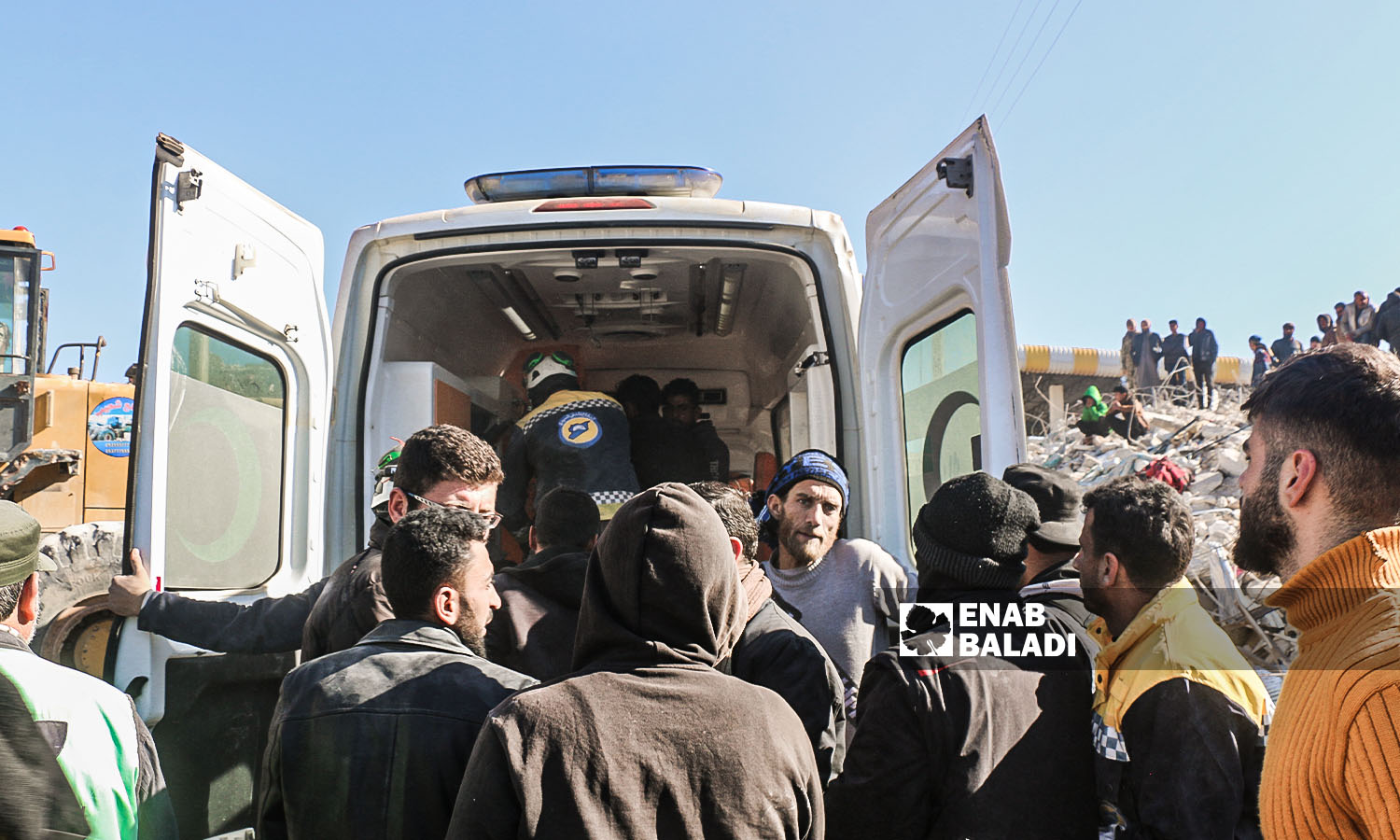



A spokesperson for the US State Department stated that his country fully supports the delivery of humanitarian assistance to all Syrians affected by the devastating earthquake and that the United States is moving quickly to provide targeted relief for survivors and the displaced.
The spokesperson, in an email correspondence with Enab Baladi, said the United States is committed to providing immediate, life-saving humanitarian assistance to help all affected communities recover from this disaster.
The United States is a strong advocate for cross-border assistance, and we fund such assistance through both the United Nations and our NGO partners. The Syria cross-border aid mechanism is effective, efficient, and transparent and will be essential for the earthquake response, the spokesperson added.
We are working hard with our Turkish Allies and NGO partners to maintain and expand cross-border access to affected areas of Syria. We continue to work to address the damage at the Bab al-Hawa border crossing to ensure international humanitarian aid can flow into Syria, the spokesperson said.
|
We fully support all efforts to provide humanitarian assistance to Syrian people in need, and we are not standing in the way of those efforts. We urge our partners to use trusted humanitarian partners and UN mechanisms to ensure aid is equitably distributed, without diversion. As our focus remains on helping the Syrian people through this humanitarian crisis, now is not the time for the regime to leverage a natural disaster to their benefit. US State Department Spokesperson to Enab Baladi |
The United States supports humanitarian access to all Syrians in need through all modalities, including cross-border, cross-line, and in regime-held areas, the spokesperson stressed.
He also said that cross-line aid convoys from regime-held areas to northwest Syria were irregular even prior to the earthquake due to logistical and security impediments.
We understand that UN agencies in Syria are assessing the route used by those convoys to determine whether it is safe and feasible to resume cross-line deliveries, the spokesperson added.
After a catastrophic earthquake and series of aftershocks hit Turkey and Syria three days ago, killing over 16,000 people, the rescuers pulled more survivors from beneath the rubble of collapsed buildings Thursday, but hopes were starting to fade of finding many more people alive more than three days, The AP reported.
Many international bodies called for the opening of all border crossings with Syria to ensure the flow of aid to Syria as quickly as possible, with the aim of improving response to the effects of the earthquake that struck the region at dawn on Monday, February 6.
With the disruption of aid delivery services to northern Syria, where the region is besieged, demands have emerged for rapid activation of the mechanism for bringing aid through contact lines from regime-controlled areas as the only solution without responding to these demands until the time of publishing this report.
Dan Stoenescu, the Chargé d’Affaires of the EU Mission to Syria, said on his official Twitter account on Wednesday that “As preparations are underway for more EU aid to flow into Syria, we call on all parties to urgently open relevant border crossings and coordinate swift and unimpeded cross-line aid deliveries. Humanitarian aid should be borderless!”
The German Special Envoy to Syria, Stefan Schneck, tweeted, “What we need now from the Syrian regime and from all sides are open border crossings and allowing aid to arrive quickly and without hindrance, to save the lives of Syrians, regardless of their place of residence in Syria.”
On the ground in regime-held areas, the regime’s agreement to assist or allowing cross-line aid was limited to media statements only, as the permanent representative of the Syrian regime to the United Nations, Ambassador Bassam Sabbagh, said that the regime is “ready” to work with anyone who wishes to provide assistance to the Syrians from inside Syria, adding, “Access from inside Syria is available, and whoever wishes to do so must coordinate with the Syrian government.”
The director of the Syrian program at the Observatory of Political and Economic Networks, Dr. Karam Shaar, told Enab Baladi that the delivery of aid through the lines is currently a top priority.
The economist believes that this proposal could be misused because the regime has been struggling for years to maintain aid only through the contact lines in order to be able to loot the largest possible number of this aid on the one hand and to extort and subjugate areas outside its control to its political desires on the other hand.
The humanitarian response in its first hours is crucial, according to Shaar. Therefore, increasing cross-line aid for a temporary period only until the ability to deliver aid through the Bab al-Hawa border crossing is restored may be more feasible than the lack of aid.
Shaar stressed that passing aid “through the contact lines” means that the regime will be more able to loot aid, and this is well known, but “this is a price we are forced to pay in these disastrous circumstances,” according to his description.
In the latest statistics issued by the Syria Civil Defense (SCD) teams, the death toll from the earthquake in northwestern Syria has risen to more than 1900 deaths and more than 2,950 injured, with the number expected to increase “significantly” due to the presence of hundreds of families under the rubble and the lack of humanitarian support for ongoing relief work in the region.
In regime-held areas, the latest statistics of the regime’s health ministry showed that the death toll reached a total of 1,262 while 2,285 people have been injured.
if you think the article contain wrong information or you have additional details Send Correction